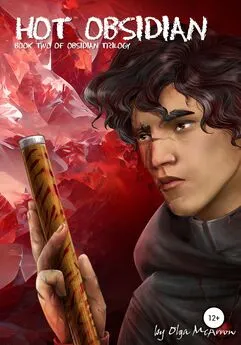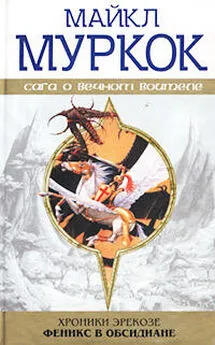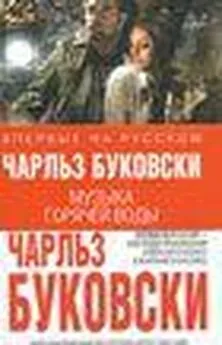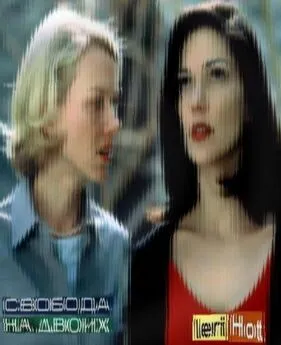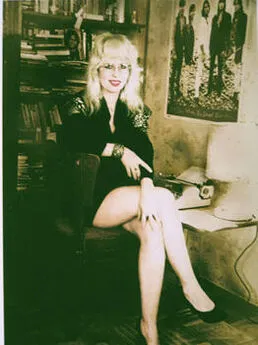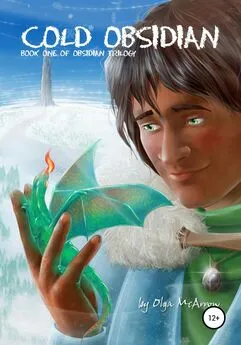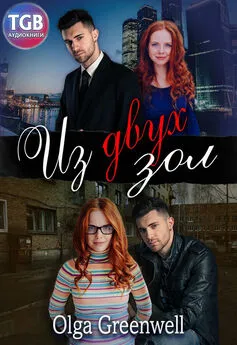Olga McArrow - Hot Obsidian
- Название:Hot Obsidian
- Автор:
- Жанр:
- Издательство:неизвестно
- Год:2022
- ISBN:нет данных
- Рейтинг:
- Избранное:Добавить в избранное
-
Отзывы:
-
Ваша оценка:
Olga McArrow - Hot Obsidian краткое содержание
Hot Obsidian - читать онлайн бесплатно ознакомительный отрывок
Интервал:
Закладка:
Day by day, the cursed tower grew, a black splinter in the skin of the earth.
Meanwhile, the gods watched from above, curious. They threw no lightning bolts and sent no curses upon humanity. Why would they? For a god, hurting a human being is like hurting a feeble-minded child; nothing to be proud of there. Breaking their tower? Sure, the gods could do that easily but why would they? Who in their right mind breaks a baby’s toy? Not gods. So they watched and they waited for little creatures down below to teach themselves a lesson.
…Being born in such a world in such a time is one of the worst things that can happen to a poet. But zealot worlds would die if no poets were born in the most difficult times. So Milia, a little blue-eyed girl, was born in the Tower Cult.
While her peers were building toy towers from pebbles and meowed miserably trying to sing the howling song of the builders, Milia made up songs of her own. There were words in them, rhymes, and music. She could turn anything into a song or a poem: golden autumns, chilly dawns, starry sky – all things she saw around her. The older Milia grew, the more powerful her songs became. And – oh, the horror! – some children left their pebble towers and howling exercises to listen to her sing.
People began talking, spreading rumours and fears around the girl. She is just a child and yet people wander from the true path because of her songs, only children for now but what will happen when she grows up? Then adult engineers and mages, workers and slaves will fall for her witchcraft and the Tower will fall. Then humanity will be doomed to crawl the earth forever and all hope of reaching the sky will be lost.
One early morning, three cult leaders – Chief Engineer, Chief Mage, and Chief Priest – held a council at the foot of the Black Tower. All three were old people, with families, with children and grandchildren of their own. Neither liked the idea of killing a child but they decided that it was necessary.
“For the future of humanity!” said the Mage and the Engineer.
“And to save the souls from sin,” quietly added the Priest.
But the sun that rose above the horizon, turned into fanatic flames in their eyes. They were flickering there like hot embers, for all the world to see… including the gods in the sky.
Soon, the three leaders announced their decision to the crowd. No one was brave enough to stand up for Milia, the shackles of faith and habit were that heavy on people. The most open-minded of them only wept when they saw the guards lead the girl to the Tower. The others just stared in silence.
“You will be led to the top of the Tower,” said the Priest, “so the holy sky would drive all the sin from your soul. Then you will be thrown down. This is the decision made in the light of the dawn before the gods themselves. Today, at midday, you will be put to death.”
Milia lifted her eyes to the top of the skyscraping Tower. That moment, fear of death seized her and took her gift of speech away. People watched in horror at the miracle of their life, now destroyed; watched the poor child try to say something and fail to do so, the very child that had been singing so merrily for them just a few hours ago. Yet again, not a single person stepped out of the crowd to help the little girl.
In the midday, Milia’s long ascension to the Tower began. The way up would be difficult for an adult warrior, let alone a child. Sometimes, she had to walk the stairs, sometimes she had a chance to catch her breath when a part of the way could be covered in a mechanical elevator or a magical levitation device. A group of armed guards clad in white followed the condemned child everywhere.
By the end of the way, Milia was so exhausted that she became as white as chalk herself. Bitter cold reigned on the top of the Tower, ferocious winds howled there, and the air was so thin the girl could barely breathe.
When Milia reached the last storey, half-built, open to the elements, the first stars were already shining in the dark, velvety sky. There were so many of them! Above the lights of the city, there was nothing that could outshine even the smallest ones. There was a river, a whole river of stars!
The power of the beautiful sight took Milia’s breath away, she gasped, she felt the fear of death release its grasp on her throat, and, finally, she sang. She could make everything into a song, even the river of stars, the river of worlds in the sky where the gods dwelled.
Carried by the wind to the foot of the Tower, that song made people wake up. They no longer stared up in silence, waiting for Milia to fall; they stirred, they cried, they cursed the Tower and those who condemned the innocent child to death. Only the three Chiefs remained unmoved by the song.
“What a horrible sorcery!” they said. “We were right to condemn the child. Just imagine what would have happened if the little witch had a chance to grow up!”
Only the gloomy warriors clad in white didn’t acknowledge the powerful song. All of them had been deaf from birth; that was why they were chosen to follow the girl. They threw Milia off the Tower, just like they were ordered to.
No one saw the child’s body fall but everyone saw the fall of the Tower itself. In roar and thunder, torn apart by huge cracks, it crashed to the ground, centuries of endless toil and howling songs turned into rubble and dust in a single moment.
The city was spared – by pure luck or the will of the gods, who knows. The only victims of the fall, by a strange coincidence, were the three Chiefs and the deaf guards. Blinded by freedom, inspired by hope, people searched and searched for Milia’s body, some even believed that she had survived the fall but no, the girl was never found.
Why did the Tower fall? Did the gods have a hand in it? Who knows.
Sometimes, heavy things just collapse under their own weight, Towers and cults alike.
As to the people awakened by Milia’s song and the Tower’s crash, they did learn their lesson. Technology, magic, and faith, when they are not balanced by other things, make unstable constructions and you need balance first of all to reach the sky where the gods dwell.
Unbalanced things always fall.
“Jarmin fell asleep again, poor thing,” said Milian. “I don’t think he’s heard the ending.”
“Yeah, he probably hasn't…” Orion scratched his neck. That sunburn on his skin was itchy. Or maybe he was feeling unsure of what he wanted to say and the subconscious gesture just betrayed that. “What’s important, is that you have. The tale was for you, Mil. Some thoughts are better told this way, you know.”
“Ah, I get it now,” Milian nodded. “That’s why you called her ‘Milia’, huh? And the tower… it’s the Order, right? You think it’s going to fall.”
“Glad to know we’re on the same page,” Orion nodded, his face unusually serious.
“And the reason is?” Milian looked him in the eye.
“Fanaticism,” was Orion’s answer. “Our glorious leader is one step away from the point of no return. Well, at least I think so. But the problem is that I have no idea what to do about it.”
“Yeah… me neither,” sighed Milian.
They walked the rest of the way to Aldaren-Turin in silence.
Ramayana’s caravan spent one day and one night in the city. Juel’s team took this time to rest and have fun. Aldaren-Turin’s market was nowhere as impressive as Torgor’s but the boys enjoyed it all the same. Some things they bought there were unique to the city and would surely make great mementoes in the future. Some books, written by the locals, were one of a kind. Handwritten and clumsily bound in cheap leather, they narrated stories only the author and a few of their friends had ever read. Taking these books on a journey into the big world seemed an interesting idea to Milian, and his friends quickly joined the fun, making the local unappreciated writers’ day.
Jarmin was a little child and children of his age are special to Kuldaganians: they are the only people allowed to swim in city fountains. It doesn’t even matter whether they are freaks that broke the Ancestors’ purity taboo or foreigners that look even more alien. They are kids and childhood is holy. So Jarmin spent the day in Aldaren Turin’s fountain, his flaxen hair looking funny among the bald heads of the descendants of Rami and Otiz, neither of which had hair on their body, brows and eyelashes excluded.
Local dlars’ walls were thick enough to keep the rooms cool even in the fiercest heat of the day and warm even in the fiercest cold the night, so everyone enjoyed the best rest possible. Speaking of walls: only Aldaren-Turin’s city wall was made of monolith; all the walls inside were plain aren concrete. The descendants of Rami and Otiz were no different from other Kuldaganian citizens in that matter.
Monolith interested Pai greatly. He wouldn’t shut up about the Wanderer’s “magic” that they used to manipulate the aspects of aren, the “magic” that worked in the unstable zone somehow without exploding. He tried to ask around, hoping to learn more, but had no luck. Definitely, a Kuldaganian city was no place to learn the Wanderers’ ways.
Pai found some consolation after the caravan had left Aldaren-Turin, though, for they now followed an ancient road paved with rune-inscribed stones enchanted to keep the sands away. Since they had stepped on that road, Pai did little but staring at those runes, absolutely fascinated by them.
For the rest of the team, the journey was as mirthless as before. Thankfully (most likely due to Irin’s constant vigil and excellent marksmanship) no bandits bothered the caravan. At some point, Ramayana Arnika-Vadro approached Irin and asked him to stay and work for her. He refused but did that so loudly and hastily that there were no doubts about how much he actually wanted to accept the offer.
When the lights of Border came into view, it was early evening with only a few stars in the sky. The collective light of the city’s oil lanterns and firefly jars made it look like a gate to the dark unknown beyond. A gate to the No Man’s Land.
Milian felt his heart sink at the sight. The image was more that it seemed. It felt like approaching a point of no return, an unseen border beyond which nothing would ever be the same. The boy could not explain the dread it was giving him and had no words to express the feeling; but the others must have felt something similar for they were all grim despite the comforts and curiosities the city could offer.
The team left the city the next morning on the backs of ten chargas that stepped so softly on the firm ground that replaced the shifty Kuldaganian sand beyond the border.
Chapter 9. Road to Tammar
Having killed a master, kill their apprentice as well, even if the apprentice is just a little child, for children grow, children learn, and children can hold a grudge. The child you’ve spared will become a warrior or a mage and come after you to avenge the master. Think of the future, always.
Assassin’s Handbook, part three
No Man’s Land. The territory of anomalies where each anomaly has a ‘heart’ that defines its centre and a circular border. Sometimes those borders cross, making the anomalous effects cancel or enhance each other but, more often, they barely touch.
Imagine a cook using a round biscuit-cutter on a thinly rolled layer of dough. Once the future biscuits have been all cut out of the layer, small, oddly shaped pieces of dough remain. This is what so-called ‘interstitions’ of the No Man’s Land look like, the territories between the neighbouring regions which don’t have overlapping borders. While still wild and unstable, the magic of interstitions is not explosive. Also, it is uniform, without any quirks an anomaly can produce.
Читать дальшеИнтервал:
Закладка:
